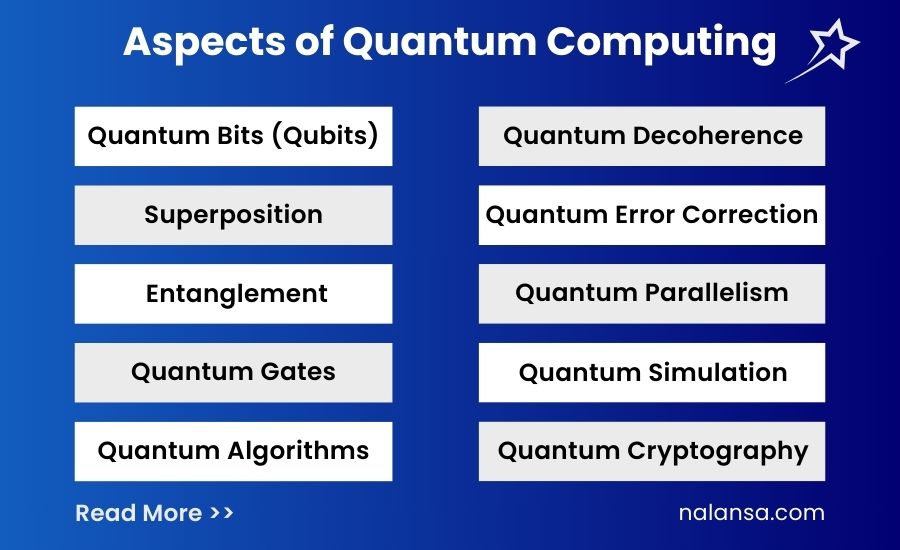In today’s fast-paced world, technology is constantly evolving. Meanwhile, complex problems persist, slowing down progress. However, imagine a breakthrough that could change everything. Enter quantum computing, a groundbreaking technology that’s transforming the way we approach complex challenges. Notably, quantum computers harness the strange and fascinating properties of quantum mechanics. Additionally, they process vast amounts of data in parallel, unlocking new frontiers in fields like cryptography, optimization, and simulation. Furthermore, this technology has the potential to revolutionize industries and shape the future. In this introduction, we’ll delve into the mysteries of quantum computing, exploring its workings, applications, and potential impact.
Table of Contents
- What is Quantum Computing?
- How Quantum Computer works?
- What are the Aspects of Quantum Computing?
- What are the Challenges in Quantum Computing?
- Conclusion
- frequently asked questions (FAQs)
What is Quantum Computing?
Quantum computing is a groundbreaking technology that harnesses the power of quantum mechanics to perform calculations exponentially faster than classical computers. By leveraging the principles of superposition, entanglement, and interference, quantum computers can process vast amounts of data in parallel, solving complex problems that were previously unsolvable.
How Quantum Computer works?
A quantum computer operates by harnessing the unique properties of quantum mechanics, unlike classical computers. It starts with qubit initialization, where quantum bits exist in a superposition of 0 and 1 states simultaneously. Then, quantum gates manipulate these qubits, performing operations like entanglement, rotation, and entanglement swapping. As qubits become entangled, their states are connected, enabling parallel processing and exponential scaling.
When measured, qubits collapse into a single state, and quantum error correction techniques ensure accurate results. Finally, quantum algorithms like Shor’s or Grover’s algorithm are executed, leveraging qubit manipulation and entanglement to calculate the result, exploiting quantum parallelism and interference. This process enables quantum computers to solve complex problems that classical computers can’t, making them a game-changer in fields like cryptography, optimization, and simulation.
What are the Aspects of Quantum Computing?

Here are the key aspects of quantum computing with a paragraph each:
1. Quantum Bits (Qubits)
Qubits, the quantum equivalent of classical bits, form the foundation of quantum computing, enabling the processing of multiple possibilities simultaneously. Unlike classical bits, which can only exist in a state of 0 or 1, qubits can exist in a state of 0, 1, or both simultaneously. This property, known as superposition, allows qubits to process multiple possibilities simultaneously, making them incredibly powerful for certain types of calculations.
2. Superposition
In quantum computing, superposition refers to the ability of a qubit to exist in multiple states simultaneously. This means that a qubit can represent not just 0 or 1, but also any combination of 0 and 1, like 0.5 or 0.75. This property allows qubits to process multiple possibilities at the same time, making them incredibly powerful for certain types of calculations.
3. Entanglement
Entanglement is the connection between two or more qubits that allows them to affect each other instantaneously, no matter the distance between them. This phenomenon enables quantum computers to perform calculations on multiple qubits simultaneously, which is known as quantum parallelism. Entanglement is a key feature of quantum computing and allows for exponential scaling in processing power.
4. Quantum Gates
Quantum gates are the basic operations that manipulate qubits to perform calculations. They are the quantum equivalent of logic gates in classical computing. Quantum gates can perform operations like rotation, entanglement, and measurement, which are essential for quantum algorithms. By combining quantum gates, researchers can create complex quantum algorithms that solve specific problems.
5. Quantum Algorithms
Quantum algorithms are specialized programs that leverage the unique properties of qubits to solve specific problems. These algorithms can take advantage of quantum parallelism, entanglement, and superposition to perform calculations that are beyond the capabilities of classical computers. Examples of quantum algorithms include Shor’s algorithm for factoring large numbers and Grover’s algorithm for searching vast databases.
6. Quantum Decoherence
Quantum decoherence is the loss of qubit coherence due to interactions with the environment. This phenomenon causes qubits to lose their quantum properties and behave classically, which can lead to errors in quantum computations. Researchers use various techniques, such as quantum error correction and decoherence suppression, to mitigate the effects of decoherence and maintain qubit coherence.
7. Quantum Error Correction
Quantum error correction is a set of techniques used to maintain qubit coherence and correct errors that occur during quantum computations. These techniques include quantum coding, decoherence suppression, and error correction algorithms. By implementing quantum error correction, researchers can ensure the accuracy and reliability of quantum computations.
8. Quantum Parallelism
Quantum parallelism is the ability of quantum computers to perform many calculations simultaneously, thanks to the power of qubits. By harnessing the properties of superposition and entanglement, quantum computers can process vast amounts of information in parallel, making them exponentially faster than classical computers for certain types of calculations. Imagine being able to try every possible combination of a lock simultaneously, rather than one at a time – that’s essentially what quantum parallelism allows quantum computers to do.
9. Quantum Simulation
Quantum simulation is the use of quantum computers to mimic the behavior of complex quantum systems, allowing researchers to study phenomena that are difficult or impossible to model classically. By leveraging the power of qubits and quantum gates, researchers can create virtual labs that simulate the behavior of molecules, materials, and even entire universes. Quantum simulation has the potential to revolutionize fields like chemistry, materials science, and physics, and could lead to breakthroughs in areas like drug discovery, energy storage, and climate modeling.
10. Quantum Cryptography
Quantum cryptography, also known as quantum key distribution (QKD), uses quantum mechanics to create secure communication channels. By leveraging the principles of quantum entanglement and superposition, QKD enables secure key exchange and encryption. Quantum cryptography has the potential to revolutionize data security and privacy.
Read about Cybersecurity : Top Cybersecurity Trends to Watch in 2024
What are the Challenges in Quantum Computing?
Here are the challenges of Quantum Computing:
- Quantum Noise and Error Correction : Quantum computers are prone to errors due to the noisy nature of quantum mechanics. Developing robust methods for error correction is essential to maintain the integrity of quantum computations.
- Scalability and Quantum Control : As the number of qubits increases, controlling and manipulating them becomes a significant challenge. Researchers must develop innovative techniques to scale up quantum computers while maintaining control over the qubits.
- Quantum Algorithms and Software : Developing practical quantum algorithms and software that can solve real-world problems efficiently is an ongoing challenge. Researchers must create algorithms that can fully leverage the power of quantum computing.
- Quantum-Classical Interoperability : Seamlessly integrating quantum computers with classical systems is crucial for practical applications. Researchers must develop interfaces and protocols that enable smooth communication between quantum and classical systems.
- Quantum Workforce and Education : Building a workforce with expertise in quantum computing is essential for advancing the field. Educating and training the next generation of quantum researchers and engineers is a significant challenge.
- Quantum Cybersecurity : The rise of quantum computing poses a significant threat to classical encryption methods, potentially compromising the security of sensitive information. Quantum computers can quickly process vast combinations, putting certain classical encryption algorithms at risk. To address this challenge, researchers must develop quantum-resistant cryptography and secure communication protocols that can withstand the power of quantum computing.
- Quantum Standards and Regulation : Establishing standards and regulations for quantum computing is essential for ensuring safety, security, and interoperability. Researchers and industry leaders must collaborate to develop guidelines and protocols for the responsible development of quantum technology.
Read Quantum Computing Microsoft Research : Quantum Computing – Microsoft Research
Conclusion
In summary, the development of practical quantum computers is a decade away, but significant progress is being made. Currently, quantum processors are limited, but advancements are expected to unlock early applications in various fields. Meanwhile, researchers are actively working on improving qubit quality, error correction, and scaling up systems. As a result, we can expect transformative changes in industries like chemistry, materials science, and logistics. In the end, the journey toward practical quantum computers is underway, and the potential rewards are profound.
frequently asked questions (FAQs)
1. What is Quantum cryptography
Quantum cryptography, also known as quantum key distribution (QKD), is a revolutionary method of secure communication that harnesses the power of quantum mechanics to encode and decode messages. This cutting-edge technology ensures the confidentiality and integrity of data transmission, providing an unprecedented level of security.
2. How far are we from practical Quantum Computers?
We’re about a decade away from practical quantum computers. Currently, 100-qubit processors exist but are noisy and error-prone. By 2025-2030, expect advanced processors with 1,000-10,000 qubits, leading to early applications in optimization, simulation, and machine learning. Quantum computers will transform industries like chemistry, materials science, and logistics, revolutionizing work and life.
3. What industries will be most impacted by quantum computing?
Industries that are expected to be most impacted by quantum computing include finance, pharmaceuticals, healthcare, logistics, artificial intelligence, and cryptography. These industries involve complex calculations, optimizations, and simulations that can benefit significantly from the speed and efficiency of quantum computing.
4. How does quantum computing affect artificial intelligence?
Quantum computing has the potential to greatly enhance artificial intelligence (AI) by accelerating machine learning processes and improving the efficiency of data analysis. Quantum algorithms could enable faster training of AI models and better optimization, leading to more powerful and capable AI systems.




